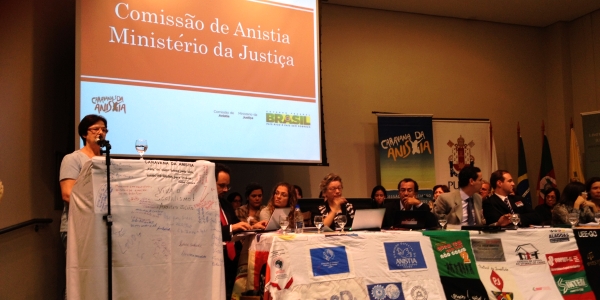Brazil’s Amnesty Caravan

20 April 2012
Between 1964 and 1985 Brazil was ruled by a repressive military dictatorship. The regime which followed the ousting of the democratically elected government of left-wing President João Goulart was in many ways typical of Latin American dictatorships throughout the continent. Freedom of speech and political opposition were brutally stifled and the regime censored all media. Many left-wing dissidents were ‘disappeared’, tortured, imprisoned and forced into exile. Only now and all too slowly is Brazil beginning to acknowledge the crimes of its past and the Amnesty[1] Caravan represents a profound move in both confronting those past state crimes and ensuring that those crimes are never to be repeated.
At a conference in Brazil’s southern city of Porto Alegre last week I was privileged to witness an ‘Amnesty Caravan’ – a hybrid truth -seeking/reparation-offering initiative of the Ministry of Justice. The Amnesty Caravan offers victims of repression the possibility of public acknowledgement, apology and reparation for the crimes of Brazil’s dictatorship. To date some 30,000 Brazilians have asked for reparations. With the opening of the military archives in 2011 the Commission now has the ability to link the crimes of the dictatorship to the specific sufferings of victims. A number of researchers have been afforded “unrestricted” access to documents in the National Archive “that make viable the identification of public agents who ordered or had been authors of acts injurious to human rights.”
The Commission travels around the country reporting on cases and hearing representations from victims in front of public audiences. Its remit is multi-faceted. As Commission president, Dr. Paolo Abrão Pires Junior reported its purpose is ‘political, judicial, reparative and cultural’. It is about acknowledging former state crimes and building the democratic transition. The Amnesty Commissioners comprise academics and members of the Justice Ministry all of whom offer their services pro bono. Many of them are young with no personal memories or experience of life under the dictatorship. Others were themselves tortured and imprisoned by the regime.
The Caravan I witnessed was held on one afternoon of the Transitional Justice conference I was attending at the Pontifícia Universidade Católica do Rio Grande Do Sul. In a packed lecture theatre of some 250 people it opened with a declaration of intent by the Commision’s president. The Caravans follow a simple pattern. A file with all relevant documents is presented by a member of the Commission assigned individual responsibility for the case. That commissioner then makes specific recommendations in terms of reparations. Following that presentation the requestor is then given the opportunity to tell their story. The personal testimonies I heard gave life to the unspeakable brutalities and suffering of those Brazilians who challenged the dictatorship. Following the testimony the Commission then publicly discusses and debates the issues raised by the request. This may take the form of the scale and nature of reparations (in one case there was a lengthy and quite heated debate over whether a man should be restored to the job he was removed from 30 years earlier with or without financial compensation for the years he was unable to work). More often, however, discussions focused on ideological and political issues arising from the crimes of the dictatorship – the impact of exile on a family, the importance of recognising the role of military militants against the dictatorship or the special implications for the widows or children of those who had been tortured or disappeared. In this sense the Caravans are also pedagogical- forcing into public debate the wider implications of state criminality, restoring memory to the public realm and facing the horrors of past regimes. Following the discussion Commissioners vote on the recommendations proposed. In some cases alternative recommendations were proposed. After the vote the commissioners and audience are asked to rise to hear the Commission’s formal decision. In every case that decision began with an apology from the Brazilian state for the crimes committed and the suffering endured, followed by the form of reparation to be offered.
The Caravan I observed dealt with seven ‘requestors’, victims of the former regime who were finally seeking some form of public acknowledgement and redress. The requestors included the widow of a former military police officer, a trade union militant who stood up against the repression his colleagues were meting out to students and dissidents. For his subversion he was brutally tortured, imprisoned and following his release he suffered years of depression before finally commiting suicide. The Commission apologised on behalf of the Brazilian state, posthumously restored him to his former role and promoted him to the rank of Senior Sergeant. His widow was also offered significant financial reparation. The restoration of her husband’s dignity – while far too late for him – was one of the most moving experiences I have ever witnessed. Other requestors included the grandson of former democratic President João Goulart. Christopher Goulart was seeking reparations for a childhood lived in exile while former student leader Peter Ho Peng who was repeatedly imprisoned, tortured and forced into exile:
“I was kidnapped, was incommunicado for over 60 days, and spent a total of 10 months in seven government prisons, including 3 notorious torture locations, and was not only beaten to unconsciousness, but also hanged in the ‘pau de arara’ where I had wires discharging direct voltage into my entire body, including my testicles and my anus.
Also, I was never charged of any crime, never judged, and my legal Brazilian citizenship was simply arbitrarily erased, and the documents given to me for me to leave the country were never found by the Ministry of Justice.” (Peter Ho Peng 2013)
Peter Ho Peng sought from the commission the restoration of his citizenship, removed by the regime almost 40 years earlier. His response to the restoration of his Brazilian identity left many in the audience weeping.
My Brazilian friends tell me that their country has been slow to acknowledge and confront the crimes of the dictatorship, but the Amnesty Caravan of which they are a central part demonstrates that the process of challenging Brazil’s brutal past has indeed begun.
[1] The use of the term ‘amnesty’ will be confusing to those outside Brazil. The Amnesty Law was fought for by the left to exonerate those arrested and imprisoned under the dictatorship. The law, however, remains on the statute books and now offers impunity to the regime’s perpetrators of torture, rape, disappearance and murder. The Commission’s title incorporates ‘Amnesty’ as a means of acknowledging the struggle that culminated in a Law which represented freedom for the opponents of the dictatorship. The campaign to end impunity can only move forward with the abolition of the Amnesty Law.










































